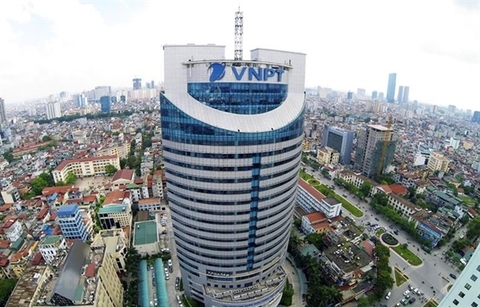
A building of VNPT. — Photo vietnamplus.vn
For many years, the mobile telecommunications market has been at the saturation point and the trend of using OTT services has replaced traditional calling and texting services, which has caused the core revenue stream of the network to decline, with revenue growth rates and profits of many telecommunications businesses falling sharply.
The Kinh tế Việt Nam (VnEconomy - Vietnam Economic Times) Magazine quoted the Minister of Information and Communications Nguyễn Mạnh Hùng as saying that the growth of network operators had been low in recent years, lower than the country’s GDP growth.
Viettel's domestic telecommunications increased by 2-5 per cent, VNPT from 2-3 per cent, MobiFone from 4-10 per cent each year.
A new generation telecommunications network with good growth must be around 10 per cent, and satisfactory growth must be above 5 per cent, said Hùng.
Việt Nam's major mobile telecommunications enterprises have now all announced their business results for last year.
Military-owned telecommunications group Viettel reported consolidated revenue of VNĐ172.5 trillion (US$7.2 billion) by the end of last year, a year-on-year increase of 5.4 per cent.
In addition to the above revenue figure, Viettel said that its telecommunications market share rose by 1.64 per cent last year and continued to maintain a sustainable leading position with 56.5 per cent.
As for Việt Nam Posts and Telecommunications Group (VNPT), the group reported total revenue of VNĐ54.86 trillion last year, equal to 102.14 per cent over the previous year.
The group's entire profit reached VNĐ4.47 trillion, equal to 100.7 per cent over the previous year.
As for MobiFone, this corporation reported a total revenue of the parent company of MobiFone Corporation will reach VNĐ25.44 trillion, profit before tax recorded VNĐ1.64 trillion, and after-tax profit margin on equity reached 7.25 per cent.
The head of the information and communications industry said that network operators had not found new growth space, while the old space has run out or even declined.
For example, traditional phone and SMS messaging services, which once accounted for nearly 100 per cent of the network's mobile revenue, will basically decrease to less than 10 per cent.
If new space was not opened soon, there would be no future, he noted.
Developing digital applications for industries was product creation, which was also Make-in-Việt Nam, said the minister. Network carriers and digital technology businesses must consider this as a research and development activity.
MobiFone Chairman of the Board of Directors Nguyễn Hồng Hiển said that the corporation would upgrade and expand Big Data systems this year, support reporting, processing and analysing data, and apply information technology to production and administration.
It will also develop and apply artificial intelligence (AI) and generative AI technology to MobiFone's products, services and technology systems.
The corporation will also continue to promote 5G business deployment, aiming to broadcast at least 1,000 5G stations this year.
VNPT General Director Huỳnh Quang Liêm said that the group would optimise resources, make comprehensive changes, be more creative, research and apply more new technologies to create new digital products to help the group enhance competitiveness. — VNS